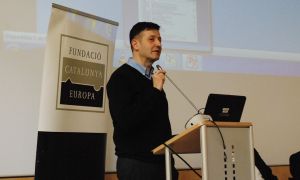"Winners and losers of the European integration system" of the UPF professor, Javier Arregui, is the winning work of the VI Catalonia Europe XXI Century Prize awarded by the Catalunya Europa Foundation with the support of the Banco Sabadell Foundation. Arregui presented the winning study to the Pompeu Fabra University at the award ceremony, which also featured a discussion board featuring Joan Majó, Antoni Castells and Javier Solana, members of the award jury.
"Winners and losers" is an innovative study in the sense that it does not focus on which are the states that benefit from the European but puts the focus on citizenship and the various social groups (pensioners, unemployed, self-employed, manual workers , farmers, students, etc). The study shows how the perception of the citizens of the European Union varies depending on the social group, but also according to the economic conjuncture.
The result, according to the Arregui study, is that we can distinguish two models of European citizens, an economic and social political elite represented by 20% of the population, which benefits directly or indirectly from the single market (skilled workers, students, researchers , etc.) and the remaining 80% that have an indifferent or even negative position of the EU. To reverse this trend, Arregui proposes to advance in democratic quality, both institutionally and politically. The problem, says Arregui, is much deeper than it seems.
The theme generated a subsequent debate on the issue that, although not appear in the front pages of the newspapers, has a fundamental background to address some of the challenges of Europe. Antoni Castells wondered if we are able to create links with Europe. Without them, says Castells, we will hardly be able to create a European demos.
For Joan Majó, it is necessary to know how to distinguish in which fields we need to deepen European integration and in which ones we do not. European construction, according to Majó, is almost a survival mechanism. "We have ceded sovereignty to the Union so that the States do not lose it altogether," he argued. Majó defended a more social European that would deal with, for example, the creation of a minimum wage at European level or the regulation of workers at a distance.
Javier Solana, on the other hand, put the focus on economic data, beyond the individual perceptions of citizenship. For Solana, the countries that have joined the European Union have experienced much higher economic growth than if the margin had been maintained. One of the paradigmatic cases is that of Poland, which in a few years has made great economic progress and has managed to reduce social inequalities but, on the other hand, the population has a very negative perception of the European Union. In spite of everything, Solana defends the optimistic vision and considers that Europe has options to advance.









